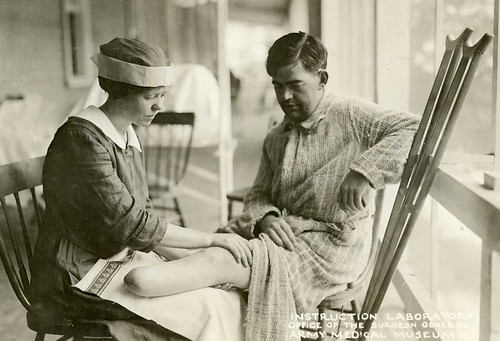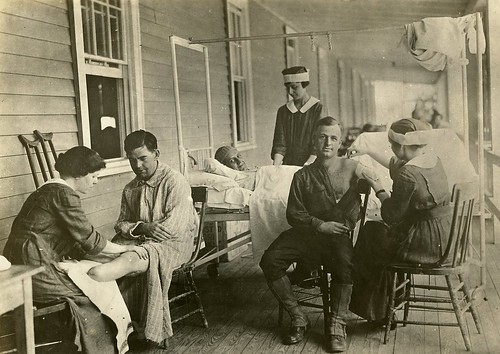Last night’s guest on “The Colbert Report” was Dean Kamen, inventor of the Segway, but more importantly — as shown last night — of the prosthetic “Luke” arm, funded by the Defense Advanced Research Projects Agency (DARPA) to give amputees a robotic arm with which they would be able to do for themselves many of the things that loss of arms to accidents or war had taken away from them. That’s a very good thing.
| The Colbert Report | Mon – Thurs 11:30pm / 10:30c | |||
| Dean Kamen | ||||
| www.colbertnation.com | ||||
| Popout | ||||
|
||||
But it put me in mind of the two wars that the U.S. is still fighting — in Afghanistan since 2001 and Iraq since 2003 — and of all the losses of limbs, & of lives, in these & other wars. And so, this poem, for National Poetry Month — in recognition of those losses, & a wish for the wars to end.
Disabled
He sat in a wheeled chair, waiting for dark,
And shivered in his ghastly suit of grey,
Legless, sewn short at elbow. Through the park
Voices of boys rang saddening like a hymn,
Voices of play and pleasure after day,
Till gathering sleep had mothered them from him.
About this time Town used to swing so gay
When glow-lamps budded in the light-blue trees
And girls glanced lovelier as the air grew dim, —
In the old times, before he threw away his knees.
Now he will never feel again how slim
Girls’ waists are, or how warm their subtle hands,
All of them touch him like some queer disease.
There was an artist silly for his face,
For it was younger than his youth, last year.
Now he is old; his back will never brace;
He’s lost his colour very far from here,
Poured it down shell-holes till the veins ran dry,
And half his lifetime lapsed in the hot race,
And leap of purple spurted from his thigh.
One time he liked a bloodsmear down his leg,
After the matches carried shoulder-high.
It was after football, when he’d drunk a peg,
He thought he’d better join. — He wonders why.
Someone had said he’d look a god in kilts,
That’s why; and may be, too, to please his Meg;
Aye, that was it, to please the giddy jilts
He asked to join. He didn’t have to beg;
Smiling they wrote his lie; aged nineteen years.
Germans he scarcely thought of; all their guilt,
And Austria’s, did not move him. And no fears
Of Fear came yet. He thought of jewelled hilts
For daggers in plaid socks; of smart salutes;
And care of arms; and leave; and pay arrears;
Esprit de corps; and hints for young recruits.
And soon, he was drafted out with drums and cheers.
Some cheered him home, but not as crowds cheer Goal.
Only a solemn man who brought him fruits
Thanked him; and then inquired about his soul.
Now, he will spend a few sick years in Institutes,
And do what things the rules consider wise,
And take whatever pity they may dole.
To-night he noticed how the women’s eyes
Passed from him to the strong men that were whole.
How cold and late it is! Why don’t they come
And put him into bed? Why don’t they come?
– Wilfred Owen
About the poet
Wilfred Owen (1893-1918) was an English poet who saw only four poems published during his lifetime: his fame came with his war poems, after his death. The war poems were written during a 13-month period from January 1917, when he was first sent to the Western Front attached to the Manchester Regiment, and November 4, 1918, when he was killed in action in France one week before the Armistice that brought World War I to an end.
About the photographs
The photographs are of American war vets under care at the Walter Reed Army Hospital during World War I.


